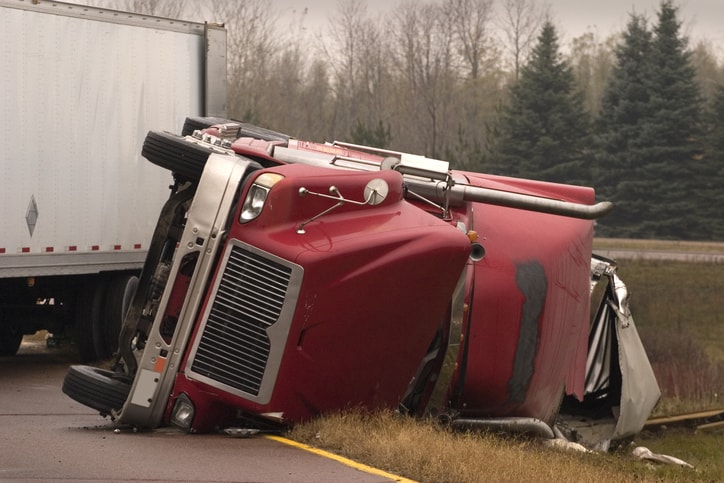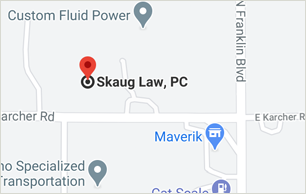What is a Jackknife Truck Accident?
Last updated Wednesday, December 14th, 2022

A tractor-trailer consists of two separate parts that are connected. The front tractor houses the cab and engine. The trailer is for hauling loads in the back. When the tractor and trailer travel in different directions, it’s called a jackknife crash.
The larger part could wind up sliding at a 90-degree angle. When both parts fail to go forward together in proper order, the semi-truck begins to fold. The result could create a ‘V’ or ‘L’ shape. The formation could resemble the hands of a clock.
Injuries and even deaths from these types of truck accidents are all too common. We’re here to help you after this traumatic ordeal. Remember – your first consultation is always free. Contact your Boise truck accident attorneys at Skaug Law, today.
What Causes a Jackknife Truck Accident?
These types of big rig crashes could be caused by:
- Drowsy Driving. When logbooks are fudged so operators can keep driving, everyone can suffer.
- Driving Too Fast. An 18-wheeler can’t stop on a dime. The average car takes roughly the length of a football field to stop when traveling at 65-mph. A semi-truck traveling at the same speed needs the length of almost two football fields to stop completely.
- Equipment Failure. When driving basics are followed and trucks are maintained, the gear could be at fault. These massive machines have many moving parts. If even one of these parts is a dud, trouble could follow.
- Faulty Maintenance. Big rigs must be properly maintained to promote safety. Skimping on or rushing through routine checks is no good. Shoddy work can also cause crashes.
- Inclement Weather. Sleet, hail, snow and even rain can create serious problems. High winds and icy roads can get the best of big rigs. These conditions are especially treacherous when worse than expected. If drivers don’t have time to find alternate routes, they may have to continue as planned.
- Inexperience. More experience equates to better driving. Even if a veteran driver can’t prevent a scary scenario from unfolding, damage may at least be contained. There’s no substitution for a well-trained, highly skilled operator.
- Load Issues. Anytime cargo isn’t properly balanced and secured into the trailer, fate is tempted. Overloaded trailers can trigger rollovers and need more stopping distance. Empty trailers have less traction. Skidding happens easily.
- Unnecessary Risks. Tailgating, turning corners too quickly and applying brakes improperly could lead to a crash.
Why Does a Truck Jackknife?
This type of 18-wheeler accident is caused by a loss of traction. One or more of the above reasons can trigger an impending jackknife. Here’s a couple of situations that may develop:
- Trailer’s Traction is Maintained. But the tractor begins losing traction at the same time. The trailer gains momentum. An accident occurs as the trailer is launched forward. The big rig could now reveal a jackknife shape.
Or
- Trailer’s Traction is Lost. Control is lost over the larger part of the semi-truck. The trailer can swerve into other lanes or the shoulder until it slams into the tractor.
What Should You do if You’re Involved in a Jackknifing Accident?
While it’s totally normal to panic, try to remain calm. Keeping your cool can help your case. Some other helpful hints include:
- Contacting Authorities. You may be one of the few people involved who can dial 911. Emergency services help in these events. Alert operator how many vehicles are involved and any other details.
- Gathering Evidence. Take pictures, jot down any notes and grab the memory card from your dash cam. Be sure to stay safe and out of the way while gathering intel. If witnesses are nearby, carefully walk over to them to get contact information.
- Seeking Prompt Medical Attention. There’s no need to suck it up. This tactic could work against you. Get a thorough onceover as soon as possible even if you feel fine. Once the shock wears off, conditions may be uncovered.
- Meeting With an Attorney. Even if you have no intention of filing a lawsuit, it’s in your best interest to meet with a savvy truck accident attorney. Our team at Skaug Law wants you to have options. Schedule a no-obligation consultation with us to learn if you could be entitled to compensation.
How to Avoid a Jackknifing Truck Accident?
The Federal Motor Carrier Safety Administration (FMCSA) offers the following safety tips for passenger car drivers:
- Always Fasten Seatbelts
- Avoid Semi-truck Blind Spots
- Be Safe When Merging and Passing Near Big Rigs
- Don’t Drive When Tired or Under the Influence
- Don’t Get Distracted While Driving
- Expect Big Rigs to Make Extra-wide Turns
- Give Tractor-trailers Plenty of Room to Stop
- Know the Differences of 18-wheelers Versus Passenger Cars
- Maintain a Safe Distance When Behind Semi-trucks
- Remain Patient When Driving Near Tractor-trailers

